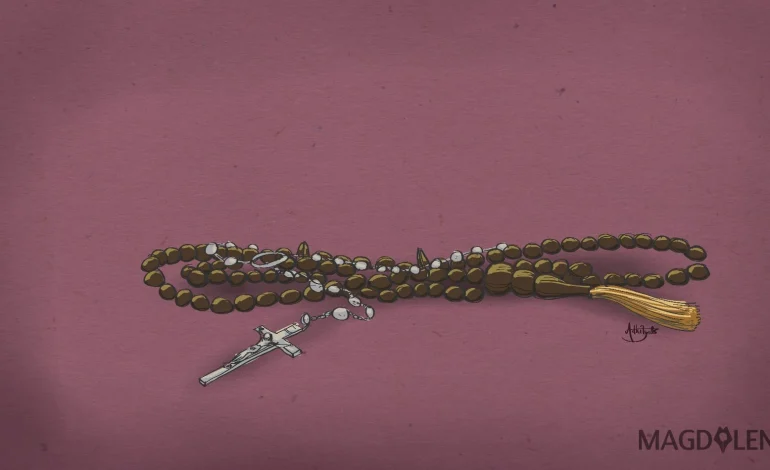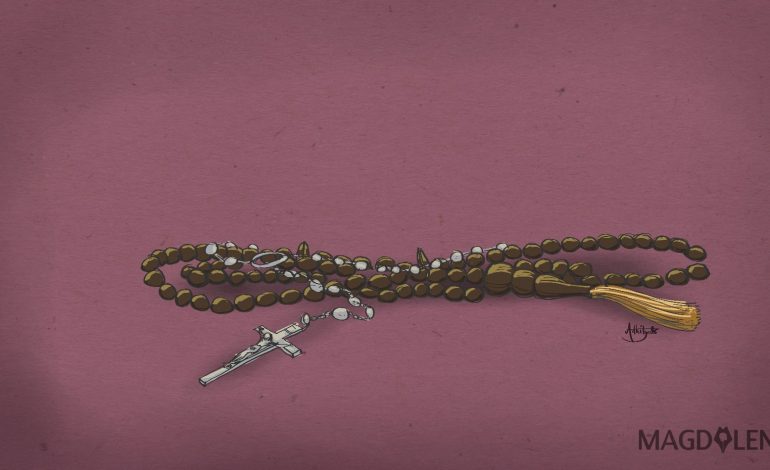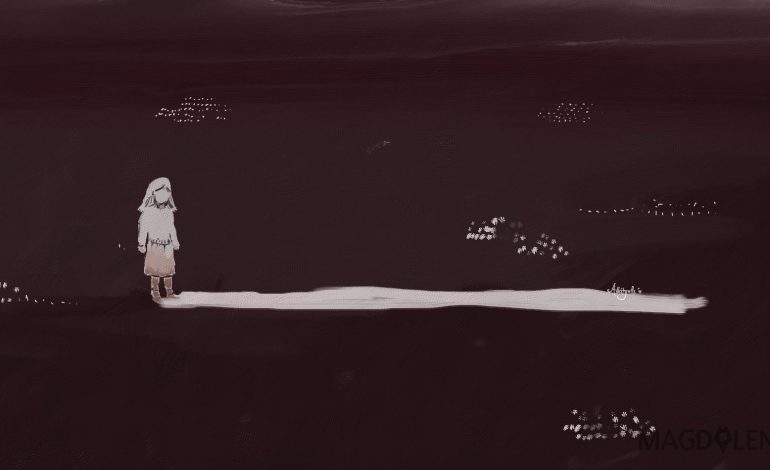Till Faith Do Us Part? Growing Up in a Two Religions Home

I’ve been warned, yes. But, at the risk of being condemned, cursed and crucified by many Indonesians, and overwhelmed with a barrage of readily used verses from the holy Quran or bibles, I must get this off my chest.
The thing is I can’t to this day understand this: How can the government interfere in the citizens’ right to choose the person they want to marry? If a couple of two different religions have a good intention to build a family together, isn’t it simply their right to do so? Yes, interfaith marriage, a sensitive issue in our society, a tinder-box filled with emotion-loaded arguments.
Last September, I made a vow that I would pop open my well-kept Perrier Jouét Champagne and spend 12 hours in the kitchen to make a complete dish of Indonesian yellow cone rice (nasi tumpeng), when I read that a couple of graduates and a student of the University of Indonesia’s School of Law filed a judicial review on the 1974 Marriage Law.
The petitioners challenged the Constitutional Court to scrap Article 1, Paragraph 1 that defines a marriage as legitimate only if it’s conducted according to the belief of the bride and groom. Maybe the judges will finally come to their senses, I thought, because, the current interpretation of that article conflicts with Article 28E from the same law that says every citizen has the freedom to practice the religion they choose.
Unfortunately, the court rejected the petition last week. So the champagne bottle has to stay in the cellar and the apron remains folded in the drawer. No victory party, kids! Meanwhile, those inter-religion couples must opt for the alternatives and more complicated way to realize their union, or they have to break up.

The Constitutional Court’s decision is one thing, the other is the argument voiced by some scholars that interfaith marriage could create confusion in a marriage for the couple as well as their children. One Indonesian woman commented on a newspaper that she rejected interfaith marriage because it caused her a “confused” upbringing. What? I had to chuckle when I read this.
That’s like eliminating cashew nuts in the global production of chocolates, because some people have bad runs after eating it. Okay, maybe not the perfect analogy, but you get my idea.
So now might be a good time to share my own story.
I am a daughter of a Muslim father and a Christian mother. I’m proud to say that my parents were joyfully and peacefully married for 32 years, until Mom passed away a couple of years ago.
They married back in the 1970s, when religious authorities did not interpret the Marriage Law as they do today and interfaith couples’ marriages were registered at the Civil Court without much difficulty. Still, they had to overcome some personal hurdles.
My Catholic mother was an ethnic Chinese from Bangka, while my Dad is the eldest child of a pious Haj parents from South Sumatra. Both sides of the family frowned on their union, which in turn motivated them to prove the world that a successful marriage had nothing to do with religions. After being wed by a Muslim cleric at the Office of Religious Affairs (KUA), the two exchanged vows in a church ceremony. They then followed it up at the civil registration.
As a curious kid, I once asked them how my (Haj and Chinese) grandparents reacted to their marriage. I was told that despite their concerns, my grandparents still opened their arms when asked for a blessing, citing they couldn’t deny their children the rights to marry someone they love. I find it amusing and hard to believe that in the 1970s, and knowing their respective cultural and religious backgrounds, this was how my grandparents reacted.
Having agreed to respect each other’s belief and to never to force their religions on their children, my parents gave us kids a dynamic and colorful home, where Dad’s prayer beads hang happily next to Mom’s rosary.
Instead of brainwashing our minds that Islam is the ultimate religion and that non-believers would burn in hell, my father taught us to respect differences. We were taught that all religions basically teach the same good values of life.
Neither of them pressured us to choose their faiths, they simply gave us the space to learn, contemplate and compare among the beliefs. We were sent for extra lesson on the Quran reading, but were never forbidden to enter a church to learn.
Every weekend my father drove my mother to her Sunday mass and waited for her till she finished. In fasting months, Mom woke up before sunrise to prepare our pre-dawn meal, and she cooked our fast-breaking meal in the evening. She accompanied Dad on Idul Fitri day to ask forgiveness from all of his Muslim families. On Christmas, we feasted with her family, with our beloved Oma (grandmother) pointing out all the dishes that contained pork.
When asked why he never asked my mom to convert to Islam, my dad said: “Religion is a personal relationship between a person and his God. I can only show her what Islam is, but I will never impose it on her. If my wife wants to convert, it should really come from her heart, not because of a pressure from or fear of her own husband.”
Never once did I see them arguing over a religion-related issue. Far from being confused, we grew up happy and knowledgeable of two religions.
A few years ago, my parents were subjected to another big hassle when they were helping me with some paper work ahead of my wedding to a non-Muslim.
As I was too busy with work deadlines, she helped me run errands before my wedding. During a visit to the Religious Court office to obtain a statement that I had never been married before, my mother was grilled by an official before she was handed the document.
On top of at least a hundred questions, the official pressured my poor old mother to vow, under God’s name, repeatedly, that my future husband would convert to Islam. If my husband remains a non-Muslim, my mother should (citing some Quran’s verses) “take over the sin”, so he would stay clean and innocent, he said. He preached her about burning in hell for letting her daughter marry a non-Muslim man.
Unbelievable, right? What gave him the right to meddle into a stranger’s personal life, to the point of harassing her? Nevertheless, she was forced to suck it up, repressing her rage, because she knew I needed to have the piece of paper to proceed with my marriage. So, rather than arguing with the officer and wasting more hours, she chose to nod in silence. That was her sacrifice to enable me to be where I am now. Five blissful years later, I thank my parents for everything I learned from their marriage.
True. My family’s experience may be just one example. But it’s time the government become more optimistic about pluralism in Indonesia. It’s time they stop poking their noses into the business of grown-up’s marriages.
And to those who are pessimistic of and judgmental against interfaith marriages: God is not a blind idiot who sees things in black and white. Whether or not something is sinful is His prerogative right to decide. Save your preaching.
Now if you excuse me, I have to help my mother in-law – who just washed my prayer clothes – prepare our Sabbath dinner.
*Read this responsefor why interfaith couples can still get married
Kathy Petite is a Zürich-based freelance contributor. She is a happily married ex-advertising-copywriter-turned-barista who actually does not drink coffee. Between her job in gastronomy and running her small home bakery, she loves escaping to the lake or forest to daydream. Send her thoughts to [email protected].






















